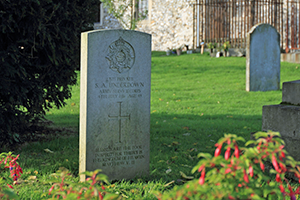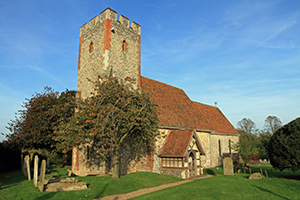First World War Project
Samuel Albert UNDERDOWN (of Norton)
b. Q1, 1867 (chr. 31st March 1867) Private, Service Number 17573 |


Samuel Albert Underdown, groom and agricultural labourer, was one of four children of James and Catherine ("Kate"). His parents were both born in Brenchley but built their family in Hunton, near Maidstone. Samuel remained with his parents throughout his adult life, so he moved with them to Yalding and latterly to Rushett Farm, Norton. He had an older brother, Thomas (b.1863), an older sister (Francis) and a younger sister, Florence ("Flora" and "Floria"). It is to Florence that Samuel bequeathed his effects as sole legattee. Perhaps because Samuel was discharged before he died, he did not receive the post-war "War Gratuity" [See Appendix 2]. By the time of Samuel's enlistment, both his parents had died. He was buried in Norton Churchyard on 7th July 1916.
So far as we can discover, Norton Churchyard is the only place to memorialise Samuel Underdown. He receives no mention on the Yalding/Hunton memorials where he lived most of his life.
Physically, Samuel stood at 5 feet, six inches tall. His chest measured 36 inches with expansion of 2". Fairly average for the time. He had a dark complexion, hazel eyes and dark hair.
Samuel's story is a poignant one. The war had defeated him even before he enlisted.
Before he had enlisted, as a civilian, Samuel explained to a Medical Board that he was called on to attend the scenes of the two local disasters. The catastrophic explosions aboard HMS Bulwark (November 1914 - 736 men lost in the mouth of the Medway) and HMS Princess Irene (May 1915 - 243 men lost off Sheerness, one of whom was Arthur Harold Hughes). Both these extraordinary events clearly haunted him to such a degree that very soon after arriving Egypt he was rendered "unfit" for continued service because of the severity of his condition ("hysteria" and "shock"). His records show that, for a period, he was marked out as acting Sergeant. And yet, he finally submitted to the burden he had been carrying since late 1914, early 1915. He was discharged under Kings Regulations, para 392 (xvi) - "No longer physically fit for war service." Authorised 13-2-1916.
Samuels physical journey began with his attestation in Aldershot on 5th March 1916 to join the 25th Labour Corps, Army Service Corps. At the age of 47 years, this was one of very few options open to him as an agricultural labourer. Having enlisted on 5th October 1915, his duties did not require the training of serving front-line soldiers. So he was embarked 11 days later on the S.S. Minnewaska, leaving Devonport on 18th October. On 31st October, Samuel was disembarked at Alexandria where he was assigned to the 25th Labour Company (A Company).
Even in this short military career, it appears Samuel was made up as acting Sergeant for a time. His formal record shows Samuel served 153 days with a "good" military character. Consequently, he was eligible for the 1915 Star, War Medal and Victory Medal. [See Appendix 1]
Samuel's psychological journey continued significantly longer.
It may be that the simple business of travelling aboard a ship was enough to trigger his psychological symptoms. It was only on 6th November 1915 that Samuel was admitted to 19th General Hospital with "hysteria". A later medical (February 1916 - Chelsea Number 67364 D) refers to findings - "Nov. 1915 at Sulva Bay. Has scar on Right frontal region above upper lobe of ear, also a small scar in front of Right ear." Cause of discharge at that time was given as "wound of head". On 12th December 1915 he was "invalided to England" on H.S. (Hospital Ship) "Gascon".
The Hospital that admitted him in England is indecipherable on the record ["Nelly? Valley?]. The medical records state: "Was close at hand when the Bulwark and Princess Irene were blown up and each time was taken to the ground and received some shock (before enlisting). Went out to Egypt but almost immediately broke down, chiefly owing to heat.
So depressed and reserved. Sleeps badly and dreams about the two explosions. The very marked signs of nervous disease but he is prematurely aged. In view of this, coupled with the present breakdown, it is recommended that he be kept for Home Service.
6/1/16: Recommended for 10 days furlough, and Home Duty."
After 17 days he was discharged "Home" on 11th January 1916 giving his home address as that of his married sister, Florence Farnham, at No.6 "Brestbury" Road (probably Prestbury Road, Forest Gate), in London - care of the London and City Midland Bank, 6 Sloane Street, Knightsbridge (for the purposes of paying his pension). A very brief medical report, dated 5th February 1916, makes reference to the Sulva Bay findings and declares Samuel's condition as "Permanent", expiring on 5th September 1916. One assumes this meant he would have had to submit himelf to further medical assessment at that time. In fact he was discharged at Aldershot on 5th March 1916,
On 30th March 1916, he was admitted to the lists of those to receive a conditional pension of 12/6 per week for six months, reduced to 4/8 thereafter. With no clue as to the final cause of Samuels death, the final record for Samuel was a proforma notification, dated 4th August , from the Royal Hospital, Chelsea to the Central Army Pension Issue Office, Baker Street - "Sir, I am to acquaint you that it has been notified to this Office that the Pensioner named in the margin died on the 4th ultimo."
On 16th May, 1917, in a review of his discharge on 5th March 1916, it was confirmed that he had been discharged with a disability "aggravated by active service overseas with an Expeditionary Force."
We have not been able to discover quite what it was that ended Samuel Underdown's life. However, described as "prematurely ageing" and suffering from "wound of head" may give a clue that he was suffering a chronic mental debilitation that was sufficiently overpowering that he simply failed to thrive on returning home.

 World War 1 Pages
World War 1 Pages